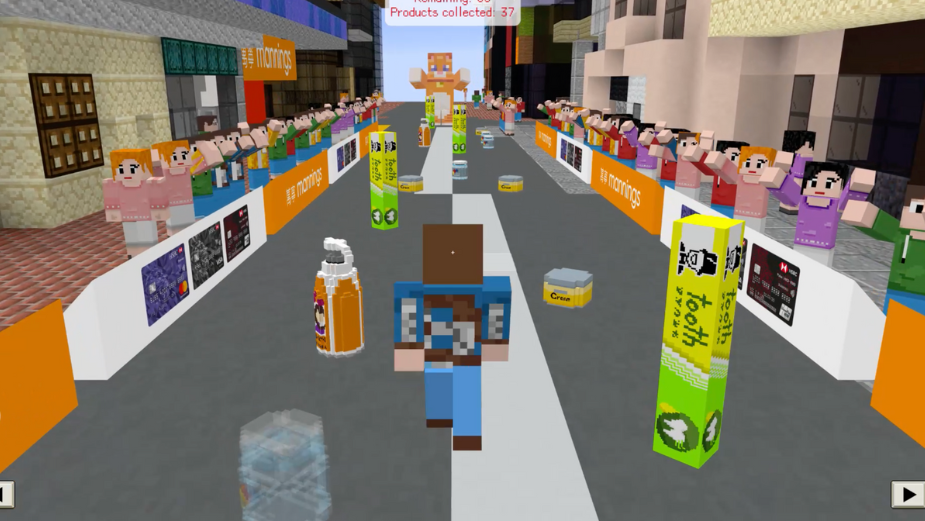
How Can Brands Optimise Opportunities in Gaming?

Image by Publicis Play
HBO's The Last of Us show, an adaptation of the blockbusting zombie saga, has kicked off to critical acclaim and huge viewership. It's debut episode saw HBO's second highest viewership for a premiere since 2010, and it's second epsode saw a record-breaking leap of viewership of 22%. And its success proves one thing: videogames are leading culture. It's not the first good quality videogame adaption - the likes of animations like Arcane, Castlevania and Street Fighter 2: The Animated Move have been winning over cult followings for years, while recent children's movies like Sonic the Hedgehog and Detective Pikachu have delighted younger viewers. But The Last of Us, starring Pedro Pascal, is, perhaps, the first grown up, mainstream videogame adaptation. And brands need to take it seriously.
If anything, the surprise is that its taken so long. Gaming is mainstream and a medium that can forge deeply emotional connections with players. The stereotypical profile of the teenage male gamer is dated. Everybody games. The recent For The Game report by dentsu Solutions indicates that this insight presents new opportunities for brands to broaden their target audience, particularly in the Asia Pacific markets.
Brands looking at gaming to reach more consumers should note thait spans generations. Globally, among Gen Z gamers, 37% play daily and 47% weekly, while among Millennials, the levels are 34% and 49% respectively. Among Gen X gamers, 33% play daily and 45% weekly, while for Baby Boomers, the numbers are 35% and 39% accordingly.
According to dentsu’s report, 34% of gamers globally play daily, and 46% play weekly. The report surveyed markets in Australia, Canada, France, Great Britain, Germany, Italy, Japan, Spain and the US.
In Australia, 70% of gamers play weekly or more frequently, with a population of 17 million who play games.
“Fifty-five percent of the global gamer population is believed to be in Asia Pacific, which adds to 1.746 billion in the size of the gaming population, which is experiencing almost 4.5% growth year on year,” says Dheeraj Raina, CEO of Media Brands at dentsu Malaysia.
While this widens the potential for gaming to be used as a marketing platform for brands in general, there needs to be a very clear strategy in marketing objective. “Thinking along the gaming ways-in spectrum, there are multiple opportunities for just about any brand to benefit from gaming. In-game advertising provides an opportunity to connect with target customer segments programmatically.
“Brands that currently sponsor sports teams or events should be looking at extending that strategy into e-sports tournaments and teams. Consumer brands that have loyalty programmes or are looking to build them should be considering how gaming can make these programmes more engaging and sticky.
“Finally, brands that engage and entertain people (think sports, hospitality, gambling, media and entertainment) should be looking at bespoke games which augment and enhance the customer experience,” says Chris Bower, CEO of Dentsu Solutions ANZ.

L to R: Dheeraj Raina, CEO of Media Brands, dentsu Malaysia; Chris Bower, CEO of dentsu Solutions ANZ
Build the Brand Journey for the Right Results
Gaming, metaverse and Web 3.0 are the blue-eyed boys of the attention economy, generating significant hype. While the metaverse is facing teething troubles, such as its barrier to entry, and we are still on a journey with Web 3.0, gaming is already a natural part of many people's lives. We're even seeing more young people choosing gaming over social media and streaming TV. “We have a strong indication that this trend is on track to continue – the proportion of Gen Z in Southeast Asia that are not using traditional social media platforms has increased by 59% since 2020,” says Jamie Lewin, chief strategy officer, Mana Partners and Publicis Play.
Leveraging on this growth potential for its clients, Publicis Groupe Southeast Asia launched Publicis Play in November last year. This strategic partnership with Web3 marketing consultancy Mana Partners, capitalises on gaming, esports, and metaverse strategies.
Publicis Play has identified organisations with “sustainable ambitions and high consumer orientation, especially those seeking to capture Gen Zs native to Play”, says Ian Loon, chief transformation officer, Publicis Groupe SEA; CEO, Publicis Groupe Media & Digital – Singapore.
Jean-Francois Thery, head of growth, Publicis Communications Singapore, believes that while this is the perfect time for brands to experiment in a very nascent market, they must have a long-term strategy in play. “More importantly, they must have a wider brand or engagement objective that is supported by cross-channel strategy and execution, including activations in gaming and Web3.”
He adds that the design thinking for Publicis Play is adaptable to clients at all stages of entry into the gaming and Web 3.0 spaces. “For instance, we are helping a tourism client make their first meaningful forays into Web 3.0 by conducting comprehensive analyses of audience behaviours and the state of different metaverse environments, setting procurement criteria for production partners, and establishing appropriate benchmarks of success.”

L to R: Jamie Lewin, chief strategy officer, Mana Partners and Publicis Play.; Jean-Francois Thery, head of growth, Publicis Communications Singapore; Ian Loon, chief transformation officer, Publicis Groupe SEA; CEO, Publicis Groupe Media & Digital – Singapore
Publicis Play also caters to a suite of clients who have made early investments in gaming, and in these instances, the agency focuses on helping them to “measure their performance and impact from their existing efforts, and maximise value for their future endeavours”, says Jean-Francois.
However, there are pitfalls to navigate in the world of gaming. Jamie shares that game environments such as Roblox and Fortnite are popular with brands because of their “impressive scale of engaged audience base and accessibility across devices”. But the “highly centralised and stringent controls” pose limitations for brands.
“The economies and levels of commerce within these centralised environments are incredibly developed, but they are also the primary reason why it can be challenging for brands to get involved. AAA game publishers, in particular, make more than enough through micro-transactions and hence are reticent to accept brand dollars at the prospect of potentially interrupting their communities’ experience,” adds Jamie.
Despite the restrictions, Jamie believes that successful brands will be able to master the play economy by “behaving authentically and earning attention and love from their communities”.
Setting Up the Game Plan for Success
The gaming journey requires brands to commit with a long-term strategy before they can reach their “gaming destinations”, says Justin Peyton, chief strategy and transformation officer APAC from Wunderman Thomson APAC.
“But rather than just destinations where people can browse a product catalogue, these are destinations that allow brands to bring their products and values to life – to make them almost visceral. But just because the tech works differently doesn’t mean that the fundamentals of marketing will change. Succeeding in these spaces will still be about making people feel something in relation to your brand, but you now have more immersive tools to use in trying to illicit those feelings,” says Justin.

However, he reminds that having more potential also means having a higher bar that brands need to reach in order for people to see it as successful. He elaborates on the factors that will influence early success in gaming:
• Avatar/Player Customisation: People define themselves as individuals, and brands who can support their individuality through avatar / player customisation are seeing new opportunity to succeed. Evidence of this is already visible in gaming by looking at the sale of character skins, and in more interaction-based worlds like Zepeto and Roblox where people also buy clothing and other personal items for their avatar.
• Reward Structures: This is another area where we expect to see growth. For example, if you play a game or perform a task in a brand’s virtual world, then you get a token or a voucher for a reward or discount on a product in the real world. In this way, digital engagement with brands will be rewarded with real-world value.
• Interplay between Real World and Digital World: Engagement that begins in the real world works just as well. For example, brands who incentivise purchase value or frequency in the real world by gifting people a free digital asset based on real world spend. In this way, brands are using digital assets with low marginal costs of production as added incentives to buy and as a way to minimise the need for discounting.
While Justin acknowledges the increasing importance of gaming in people’s live, he reminds that Wunderman Thompson’s proposition and capability set isn’t “designed around a single service like gaming, but around helping brands to maximise the value they can get from those singular services by making those connections”.
Rather, the focus is to help brands “understand and activate gaming solutions that naturally extend their value proposition and relevance in this evolving ecosystem, and to take advantage of the unique experiences gaming can create”, he says.
Indeed, as audiences around the world are gripped by the emotional story of Joel and Ellie battling mycellial zombies, and are delighted by the glimpses of games-accurate depictions of key locations, it's clear that there are rich connections to be had by connecting with the gaming mainstream sincerely. It's not just the gaming ecosystem itself that's evolving but gaming's position and role within the wider cultural and social landscape.













